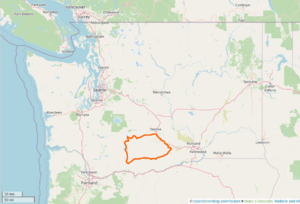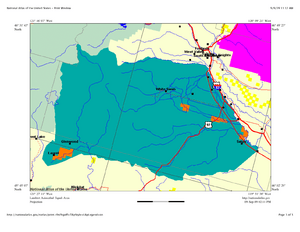Yakama Indian Reservation facts for kids
Quick facts for kids
Confederated Tribes and Bands of the Yakama Nation
|
|
|---|---|

Location of the Yakama Indian Reservation within Washington
|
|
| Country | |
| State | Washington |
| Negotiated | c. 1855 |
| Government | |
| • Body | Yakama Nation Tribal Council |
| Population
(2020)
|
|
| • Total | 31,591 |
 
Map of the Yakama Indian Reservation
|
|
| Total population | |
|---|---|
| 31,799 (2000) | |
| Regions with significant populations | |
| United States (Washington) | |
| Languages | |
| English, Spanish, Ichishkíin Sínwit | |
| Related ethnic groups | |
| other Klikitat, Palus, Wallawalla, Wenatchi, Wishram, and Yakama peoples |
The Yakama Indian Reservation (spelled Yakima until 1994) is a Native American reservation in Washington state of the federally recognized tribe known as the Confederated Tribes and Bands of the Yakama Nation. The tribe is made up of Klikitat, Palus, Wallawalla, Wenatchi, Wishram, and Yakama peoples.
Contents
Geography
The reservation is located on the east side of the Cascade Mountains in southern Washington state. The eastern portion of Mount Adams lies within this territory. According to the United States Census Bureau, the reservation covers 2,185.94 square miles (5,661.56 km²) and the population in 2000 was 31,799. It lies primarily in Yakima and the northern edge of Klickitat counties. The largest city on the reservation is Toppenish.
About 80% of the reservation's land is held in trust by the federal government for the benefit of the tribe and tribal members. The remaining 20% of the reservation's land is privately owned.
Some 410,000 acres of the reservation are shrub-steppe rangeland; as of 2014, about 15,000 wild horses roamed these lands—an unsustainable population, many times what the land can support.
History
The reservation was created in 1855 by a treaty signed by Washington Territory Gov. Isaac Stevens and representatives of the Yakama tribe. Several Native leaders believed that those representatives did not have the authority to cede communal land and had not properly gained consensus from the full council or tribe. A dispute over the treaty conditions led to the Yakima War (1855–1858), which the Yakama and allied tribes waged against the United States.
Following the Bannock War of 1878, the United States government forced the Northern Paiute people out of Nevada and onto the Yakama Reservation, although most had not been involved in the war. The more than 500 Paiute in Washington were subjected to privation for more than a decade before being allowed to return to Nevada. They were forced to compete for the limited resources and housing on the reservation with peoples who had been established there for decades. The Paiute did not return to Nevada until the 1886 expansion of the Duck Valley Indian Reservation permitted them to reunite with their Western Shoshone brethren.
In 1994, the Yakima Tribal Council unanimously voted to change the spelling of the tribe's name from Yakima to Yakama, matching the spelling of the 1855 treaty. The pronunciation remained the same.
The Yakama reservation was affected by the Cougar Creek fire, one of the 2015 Washington wildfires. About 80% of the Cougar Creek fire burned on reservation land. The Yakama responded by salvage logging.
Membership
Roughly 10,000 people were enrolled members of the Yakama Nation in 2009. The required blood quantum for tribal membership is 1⁄4.
Economy
The Yakama Nation suffers from high poverty and unemployment; a 2005 report indicated that 42.8% of Yakama Nation families lived in poverty. As of 2017, there was a wait list of 1,800 families for tribal housing, and high rates of homelessness. In 2016, an encampment at the reservation was set up by about 130 people evicted from tribal housing. Members of the tribe responded by building tiny houses, but the structures do not have plumbing and are not viewed as a permanent solution.
The tribe undertakes forest management activities, including a lumber mill that supports several hundred jobs in the region. The tribe owns one of the largest commercial forests in the country, which makes up a sizable percent of the tribe's income.
The tribe operates a casino, one of the few Native American casinos in the United States that are "dry" (alcohol-free).
The Yakama Nation is one of several tribal governments in the northwestern United States to offer free bus service on its reservation.
Communities
See also
 In Spanish: Reserva india Yakama para niños
In Spanish: Reserva india Yakama para niños

